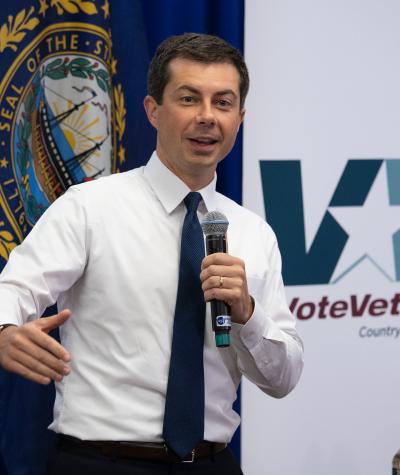By Campaign Legal Center's federal reform team
As wealthy special interests continue to tilt the political system in their favor by writing six and seven-figure checks to super PACs, Congress has failed to update campaign finance laws to ensure the independence of those super PACs.
And in the absence of congressional action, new evidence of close ties continues to emerge, such as in the case of former presidential candidate Pete Buttigieg and the super PAC that supported his campaign in the Democratic primary.
Super PACs may raise and spend unlimited amounts only if they are independent of the candidates they support. The super PAC VoteVets was anything but independentFederal Election Commission (FEC) reports shed further light on how closely it was linked to the Buttigieg campaign.
While much of this activity may not have violated the letter of current law, it at a minimum violated its spirit.
VoteVets saw its fundraising explode as Buttigieg’s campaign took off earlier this year, buoyed in large part by six-figure donations from major Buttigieg donors, and then drop dramatically after Buttigieg’s exit from the race. This trajectory is yet further evidence of how VoteVets operated as effectively an extension of the Buttigieg campaign.
VoteVets endorsed Buttigieg in December (“its first presidential endorsement ever,” VoteVets emphasized) and went on to spend $3.6 million supporting his candidacy.
In February 2020, Campaign Legal Center (CLC) filed an FEC complaint alleging that the super PAC illegally coordinated hundreds of thousands of dollars in spending with the Buttigieg campaign, after a campaign staffer tweeted—and the super PAC heeded—a detailed request for pro-Buttigieg ads in Nevada.
The ties between the super PAC and campaign did not end there.
Earlier this year, the super PAC hired a former Buttigieg fundraiser named Zachary Allen. Then, in February, top donors to the Buttigieg campaign started writing big checks to VoteVets.
According to CLC’s analysis, all ten individual donors who gave direct six-figure sums to VoteVets in February had previously given at least $2,800 to the Buttigieg campaign. Two of those donors had also given six-figure checks at the end of the previous month; up until that point, VoteVets had largely been raising more moderate amounts.
This strongly suggests that these wealthy donors gave to the "independent" VoteVets in order to support Buttigieg—potentially in response to solicitations by Buttigieg’s former fundraiser.
Allen’s jump from the Buttigieg campaign to the super PAC does raise legal questions. A campaign staffer is generally supposed to undergo a 120-day "cooling off" period before going to work for an outside group supporting that campaign.
Allen didn't wait that long: the Buttigieg campaign's final reported payment to Allen's consulting firm, V2 Consulting was December 27. VoteVets' first reported payment to Allen’s firm was less than two months later, on February 24 (and reports indicate he started working for the super PAC even earlier).
Buttigieg dropped out of the race on March 1. And VoteVets then disclosed a dramatic drop in its fundraising: the group raised more than $10 million in February, but raised only about $300,000 in March—just 3% of its February total. In April, it raised even less: just $100,000 in new contributions.
In sum: VoteVets hired a Buttigieg campaign fundraiser, and, shortly after that, top donors to the Buttigieg campaign started writing big checks to VoteVets. Once Buttigieg dropped out of the presidential race, those checks stopped flowing, and VoteVets raised only 3% of what it had the previous month.
Notably, the close fundraising ties between the Buttigieg campaign and VoteVets may not have violated the law. Current coordination rules largely focus on coordinated campaign spending, rather than coordinated fundraising.
Even if most of these activities do not violate current law, they directly contravene assumptions courts have drawn on when allowing unlimited “independent” spending in our elections. If spending is completely independent of candidates, courts’ logic has gone, it cannot be limited on anti-corruption grounds.
Yet complete independence would seem to be a far cry from how VoteVets and the Buttigieg campaign—merely one of many examples of pairs of campaigns and supposedly independent outside groups—were functioning.
Bipartisan legislation like H.R. 679, the Political Accountability and Transparency Act, as well as provisions in H.R. 1, the For the People Act, would update federal law to address this problematic practice.
Both bills would deem Vote Vets’ spending coordinated if it ran pro-Buttigieg ads after hiring the Buttigieg campaign’s recent fundraiser, regardless of whether that person informed the super PAC’s ads.
